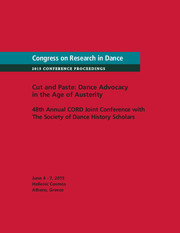No CrossRef data available.
Article contents
Dance Britannia: The Impact of Global Shifts on Dance in Britain
Published online by Cambridge University Press: 23 September 2014
Abstract
The music and dance of African Diasporan artists has impacted current dance practice in Britain, and their legacies are testament to the global circulation of artistic ideas. This paper discusses the British Dance and the African Diaspora research project which seeks to write Black British dance artists and their legacies back into history. It aims to understand the nexus of aesthetic, institutional, and conceptual problems that have rendered these dancers invisible.
Since the 1970s, a number of black British-based dancers has been teaching and producing performance work in a variety of dance styles. It was influenced by the context of anti-colonialism and the struggle for independence, which has been the motivation for the post-war generation of Caribbean and Asian artists who migrated to Britain. These historical and cultural contexts form the basis for our argument for new approaches to frameworks for analysis of the work of black British dance artists.
- Type
- Research Article
- Information
- Copyright
- Copyright © Christy Adair and Ramsay Burt 2014


